- Home
- Andrea Penrose
Murder at Queen's Landing Page 2
Murder at Queen's Landing Read online
Page 2
His expression pinching to an oddly pensive look, Sheffield crossed the carpet and took a seat in one of the armchairs set by the hearth. “Perhaps I’m trying to change.”
“Well, that calls for a drink,” quipped Tyler as he moved to the tray of decanters on the side table. Sheffield was very fond of the earl’s expensive brandy.
Sheffield dismissed the suggestion with an airy wave. “No, no. I wish to keep a clear head.”
“Are you ill?” queried Wrexford.
“Ha, ha, ha.” Assuming an injured look, his friend slouched deeper into the pillows. “Actually, I was hoping to discuss something—” He stopped short as he caught sight of the waistcoat Tyler was carrying, and then started to laugh in earnest.
The valet fixed him with a pained look. “Pray, what’s so amusing?”
“The idea that Wrex might wear that.” Sheffield made a face. “Ye heavens, he would look like one of those peacocks from the court of King Charles I. You know, the ones painted by what’s-his-name, the flamboyant, good-looking fellow who was a great favorite with the ladies.”
“Anthony Van Dyck?” suggested the earl.
“Yes, that’s him.” His friend looked rather pleased with himself. “As you see, I didn’t sleep through every lecture at Oxford.”
Heaving a long-suffering sigh, the valet stalked out of the room.
Sheffield’s smirk lingered for a moment and then gave way to a more uncertain mien. “I daresay Lady Charlotte is feeling nervous about making her first grand entrée into Society.”
Another of Charlotte Sloane’s secrets had recently wrought a great change in her life. The daughter of an earl, she had been disowned by her family for eloping to Italy with a man beneath her station. And then, after becoming a widow, she had dared to forge an independent life for herself within the dog-eat-dog world of the lower classes through talent, grit, and determination. But the recent murder of her cousin—and the arrest of his twin brother for the crime—had forced her to step out of the shadows and back into the glittering world of the beau monde in order to find the real culprit.
Wrexford moved to the side table and poured himself a brandy. “I daresay she is.” He lifted his glass. “You’re sure you won’t join me?”
A curt wave dismissed the offer.
He shrugged and took a swallow, allowing the liquid fire to prickle against his tongue.
“What if it turns out that she hates this new life?” Sheffield rose and began to pace. “You know how she despises the hypocrisy and selfishness of the aristocracy. She’s already made some small compromises, but she’ll have to keep making even more changes to fit into her new world, and . . .”
His friend gave a troubled sigh. “And once you change, there’s no going back.”
“Change is an inexorable part of our existence, Kit,” he replied. “With every tick of Time, we’re moving ever closer to our mortality. Our lives are in a constant state of flux. Try as we may, we can’t stand still.”
“Thank you. That makes me feel ever so much more sanguine about the coming evening.” Despite the quip, Sheffield looked even more unsettled.
The earl sensed they were talking about more than Charlotte’s challenges. “The idea of change frightens us all, Kit.”
“Not you.” His friend came to a halt. “Nothing rattles you.”
Ah, would that it were so, thought Wrexford.
“You have the gift of sardonic detachment,” Sheffield went on. “You can laugh at the absurdities of our human foibles rather than find them terrifying.”
“Terror is also an inexorable part of our existence,” he said quietly. “To claim otherwise means there’s no blood pulsing through your veins.”
“But how—”
“Don’t fret over Lady Charlotte,” counseled Wrexford. An oblique answer, perhaps, to the real question his friend was asking. But Sheffield was a clever fellow. “She has courage, resilience, a sharp sense of humor.” He paused. “Most importantly, she has friends. Terror loses its power when you’re not facing it alone.”
An odd glimmer seemed to spark beneath Sheffield’s lashes. “Did I just hear you say a good word about the power of friendship and love?”
“Heaven forfend. You must have imagined it.” Wrexford quaffed another swallow of brandy. “But getting back to what you started to say a moment ago . . .” He quickly changed the subject, having no wish to pursue the topic of emotions. “You wish to discuss something?”
“Yes.” His friend looked away for a moment. “A rather important matter, in fact.”
“Ah.” The earl’s lips twitched. “I take it you’ve run through your quarterly allowance and wish to borrow some blunt for brandy and revelries.”
Sheffield stiffened. “I’m aware of my reputation—admittedly richly deserved—as a beef-witted fribble. So you’ve every right to be sarcastic. But I wish . . . I wish to change.” He drew in his breath. “And so . . .”
Wrexford put down his glass, cursing his rapier tongue.
“And so I have a business proposal to present to you,” blurted out Sheffield as he pulled a sheaf of papers from the leather portfolio he had tucked under his arm. “Assuming, of course, that you’re willing to listen, instead of falling into a fit of laughter.”
Am I really such an unfeeling friend? The thought wasn’t a comfortable one.
“Let us go down to the study,” he replied, “where we may spread out your documents and have a careful look at everything.”
“Thank you.” Sheffield’s look of gratitude made him feel even more like an arse.
The earl led the way down the stairs to a comfortable room filled with carved bookshelves, leather armchairs, and an overstuffed curio cabinet of scientific oddities. The massive desk had a well-used look, its age-mellowed pearwood top nearly invisible beneath the stacks of scientific journals and books on chemistry.
Wrexford quickly cleared a space for his friend’s papers and then took a seat as Sheffield arranged his documents in several neat stacks before clearing his throat.
“Seeing as we shall soon be capering in a ballroom, I won’t dance around the tree. I would like to ask you for an investment to start a business.” His friend gestured at the papers. “You will find all the details there—what it is, why it will be profitable, the financial projections for the first phase of operation.” A pause. “And the number of shares you shall receive in the company.”
Sheffield tugged a little nervously at his cuff. “Please take your time in reviewing the material. If you have any questions, I shall endeavor to answer them.”
A silence settled over the study, stirred only by the whispery flutter of paper and the muted crackling of the banked coals in the hearth. As Wrexford read through the pages, he found himself growing more and more impressed. The details of the business were presented in an articulate and well-reasoned outline, and the projection of profits was quite conservative. All in all, it appeared a very professional proposal.
He looked up. “I take it you have partners in this endeavor?”
“Yes,” answered Sheffield. He didn’t elaborate.
Curious, the earl replied, “Might I ask whom?”
His friend hesitated and averted his eyes. “I would prefer not to say, if you don’t mind.”
Wrexford couldn’t help but raise a brow.
“Not for any unscrupulous reason,” added Sheffield hastily. “I think you’ll approve of them. But at the moment, I’m not at liberty to reveal that information.”
“Very well.” Wrexford decided to respect the request but then went on to ask some lengthy questions related to the matter of costs and profits and the actual running of the business. He could easily afford the requested investment, but it wasn’t a paltry sum. And he knew that if the business failed, his friend would feel ashamed of squandering the earl’s money.
Sheffield answered the queries with a calm confidence, showing an excellent understanding of the proposed company, including his own role. “Because of m
y family connections and my entrée into Society, I’ve assumed the main duties of raising investments. But I’m also involved in choosing what imports will appeal to the aristocracy. One of the partners is highly skilled in doing the complex financial projections, and one of them has expertise and contacts in the world of shipping.”
After a bit more probing, Wrexford was satisfied. “It appears a very solid plan.” He scribbled out a note and sealed it with his signet ring. “Take this to my banker tomorrow and he’ll give you the funds.”
His friend expelled a breath, a flicker of relief lighting beneath his lashes. “Again, my thanks. I owe you a debt of gratitude, Wrex.”
“Actually, you don’t,” he replied. “I’ve no intention of taking any stock from you. I’m happy, simply as a friend, to invest in your future, and wish you great success.”
“No!” Sheffield fisted his hands and made no move to pick up the promissory note. “I’m not asking for charity.” There was a tone in his friend’s voice that he had never heard before. “This is a business deal and will be done as such—or not at all.”
“As you wish,” agreed Wrexford, though a frisson of unease tickled down his spine. He fervently hoped that his friend’s partners were competent. If the company failed, Sheffield would, he feared, take it very hard.
His friend gathered up the papers before pocketing the note. “You had better begin dressing,” he murmured, glancing at the mantel clock. “The ball begins soon, and you’ve promised to lead Lady Charlotte out for the first waltz. You can’t leave her standing like an abandoned flower, left to wilt in the shadows of the wall.”
The chiding, however oblique, stung. “Do you truly think I would leave Lady Charlotte in the lurch?”
Sheffield flushed. “No, of course not! But . . .” His words trailed off in a muted rustling as he placed the documents back in his portfolio.
“But what?” asked the earl softly.
There was a heartbeat of hesitation before his friend reluctantly replied, “But there are times when your sentiments are . . . difficult to discern. They often flicker between day and night . . . reflecting the warmth of the sun or the coolness of the moon.”
It was an astute observation, admitted the earl. “Perhaps it’s simply my fate to be contrary. The dark and light sides of my nature are constantly at war with each other.”
Sheffield fixed him with a searching stare, but before he could reply, Wrexford turned the conversation back to the ball. “Lady Charlotte won’t lack for support as she reenters the world of the beau monde. I’m well aware that pomp and glitter are needed to impress them and ensure her acceptance into Polite Society—an ironic moniker, seeing as they are, for the most part, naught but a pack of well-groomed, sharp-clawed feral cats.”
The earl gave a shrug. “Be that as it may, I’ve taken care of arranging the right partners for her. And don’t forget that her cousin Nicholas, the new Lord Chittenden, and her good friend Lord Sterling will be there to lend moral support.”
“Well, then,” murmured Sheffield. “It appears there’s no reason to worry. The evening should spin along with nary a slip or stumble.”
* * *
There was a spun-sugar, fairie-tale splendor to the scene. The curling grand staircase of pure white marble led up to a landing, where two massive urns of pale pink roses flanked a thick gold-threaded burgundy runner, its sinuous velvet beckoning the invited guests to enter....
Lady Charlotte Sloane slowed her steps and drew a deep breath as she eyed the ornate archway leading into the ballroom. Music floated out of the open doors, the notes twirling a merry dance with the effervescent laughter and discreet clink of champagne glasses. Diamond-bright light from the crystal chandeliers illuminated the jewel-tone sparkle of the ladies in their sumptuous gowns and the muted elegance of the gentlemen in their evening finery.
It was the stuff of every wellborn schoolgirl’s dreams....
To her horror, Charlotte felt a prickling against her eyelids. Damnation—I ran all the way to Italy to escape living in just such a gilded cage.
“Chin up, gel,” murmured Alison, the dowager Marchioness of Peake, taking a firmer hold of Charlotte’s arm. “I imagine you’ve faced far more fearsome challenges than stepping into a crowd of overfed aristocrats.”
“Remind me again why I’m doing this.” She squinted. The glitter was hurting her eyes. “At seventeen, I was wise enough to know I’d never survive as a pasteboard cutout, corseted in the tight strictures of Society.”
“Yes, but now you’re ever wiser, because you’ve learned how to make your own rules,” replied the dowager.
Rules. Ever since she could remember, Charlotte had chosen to live her life breaking every possible blue-blooded rule in the book.
Choices, choices. Her recent decision to step out from the shadows and reenter the world of the beau monde had allowed her to find her cousin’s killer. But the triumph had not come without a cost, for now there was no going back to her previous life, where anonymity had allowed an unfettered freedom and independence.
And so, here she was—a world-wise widow who was more at home in the slums than the fancy salons—attending her first formal ball. The irony was even sharper as she made her living satirizing the world of indolent excesses, along with the ladies and gentlemen with whom she was rubbing shoulders.
“And,” added Alison, “you’re doing this because you’re rather fond of your doddering old great-aunt and know how much I’m looking forward to stirring up some gossip among the pompous prigs and featherbrained widgeons of the ton.” Her blue eyes took on a sharp-edged gleam. “Life was becoming sadly flat before you stepped back into my life. And what fun is it if one loses the reputation of being a Holy Terror?”
A smile touched Charlotte’s lips. Alison had been the only adult member of her stiff-rumped family who had understood—and encouraged—the wayward girl whose curiosity and imagination refused to be confined within conventional thinking.
“It’s you who gave me the courage to fly in the face of conformity,” she murmured.
“Oh, pfft. It’s not as if you’ve done anything really outrageous.”
Ha! She and the dowager had only recently reconnected, and her great-aunt didn’t yet know the full scope of Charlotte’s . . . eccentricities.
Alison thumped her cane on the carpet, cutting short any further musings, and quickly led them through the requisite greeting of their hostess.
“Now come, let us enjoy the pleasures of wine and waltzing until dawn.” Thump-thump. “Remember, we are here to enjoy a night of revelry.” The dowager waved for a footman to bring over his tray of champagne. “And we may begin by joining those two young jackanapes by the refreshment table.”
Charlotte’s face wreathed in a smile—a genuine one—when she spotted her cousin Nicholas and her childhood comrade in mischief. Jeremy, who through an unforeseen quirk of family travails was now the very wealthy Baron Sterling, looked up and met her gaze with a grin.
“Well, well, here I go away from London for several months and all hell breaks loose,” he murmured as he came forward and leaned in to brush a kiss to her glove.
A cold-as-ice shiver raced down her spine. It was true—the murder of Nicholas’s twin brother and his subsequent arrest for the heinous crime had plunged her and her friends into a dark and dangerous netherworld of unimaginable horrors as they refused to give up on proving him innocent. Without the help of . . .
“Thank heavens for Wrexford,” added Jeremy. “Granted, he’s an arrogant and irascible devil, but he possesses the intelligence and iron will to beat Satan at his own game.”
“We were lucky,” she said softly.
All trace of humor died in his eyes. “So I heard.” Charlotte herself had come perilously close to sticking her spoon in the wall. “I should have returned from the North to help.”
“Your friends needed you,” countered Charlotte. “And none of us dreamed that things would take such an unexpected turn.”
“Yes, well, murder has a way of drawing you into all sorts of unpleasant surprises,” replied Jeremy, who had been caught up in one of their earlier investigations. “I fervently hope that from now on, you and the earl will stop tripping over dead bodies . . .”
He paused and raised a brow. “Ah, speak of the devil.”
CHAPTER 2
Charlotte slowly turned, the flutter of her fancy silks stirring a pebbling of gooseflesh on her bare arms.
Wrexford was easy to spot in the crowd. Tall and broad shouldered, his Satan-dark hair falling over his collar in unruly tangles, he was dressed entirely in black, save for the touch of starched white linen at his neck.
His evening attire was exquisitely tailored, she noted. However, his scowl—also black—was cut from a different cloth.
He disliked pompous prigs even more than she did.
Feathers bobbing, a gaggle of turbaned matrons scattered at his approach, clucking like helpless chicks whose henhouse had just been invaded by a wolf. A murmur ran through the room—Wrexford was known for his volatile behavior—as the earl stopped and looked around.
Their eyes met.
And a glint of emerald sparkled through his lashes as the scowl softened, allowing his lips to curl ever so slightly upward.
Charlotte drew in a breath, suddenly feeling as if she had just swallowed a flock of butterflies.
What an odd sensation, she mused. It must be the champagne that was making her feel so fluttery.
“Wrexford!” called the dowager, breaking away from her conversation with Nicholas to wave him over.
“Milady.” The earl executed a faultless bow. “How very naughty of you to cast all the fresh-faced young beauties in the shade.” Looking up with a spark of unholy amusement, he lowered his voice to a mock whisper. “Intelligence and experience in a lady are far more alluring than simpering smiles and vapid conversation.”

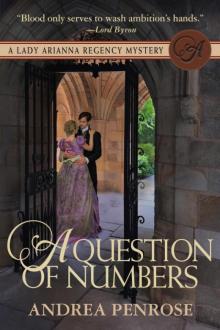 A Question of Numbers
A Question of Numbers Murder at Queen's Landing
Murder at Queen's Landing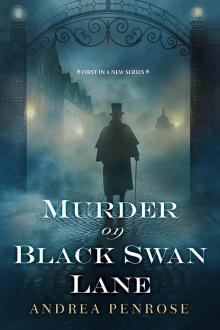 Murder on Black Swan Lane
Murder on Black Swan Lane Sweet Revenge
Sweet Revenge The Cocoa Conspiracy
The Cocoa Conspiracy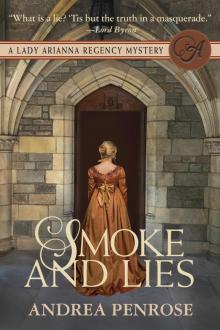 Smoke & Lies
Smoke & Lies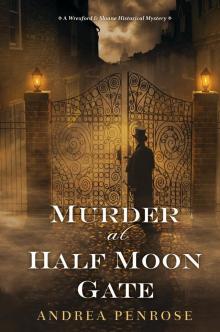 Murder at Half Moon Gate
Murder at Half Moon Gate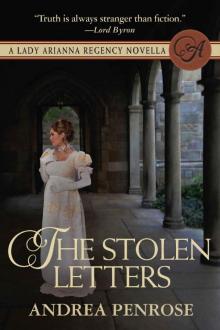 The Stolen Letters
The Stolen Letters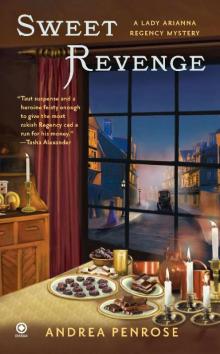 Sweet Revenge lahm-1
Sweet Revenge lahm-1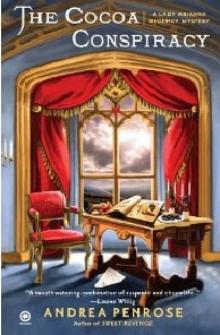 The Cocoa Conspiracy lahm-2
The Cocoa Conspiracy lahm-2